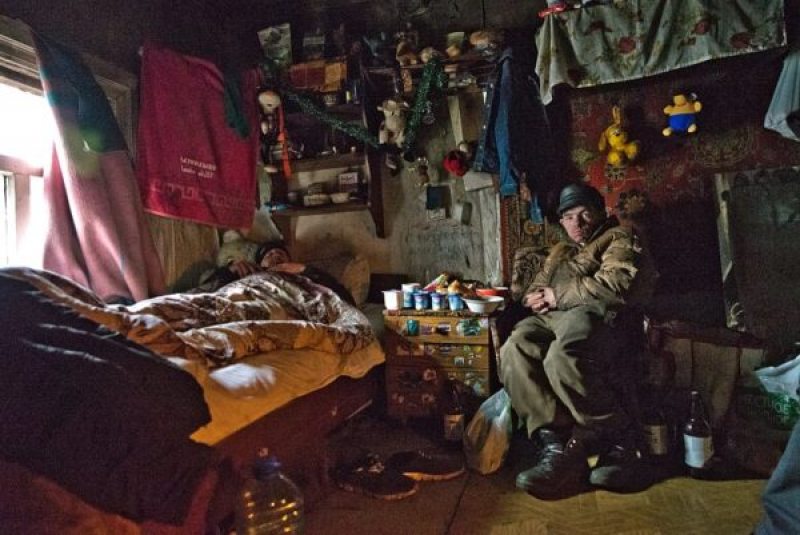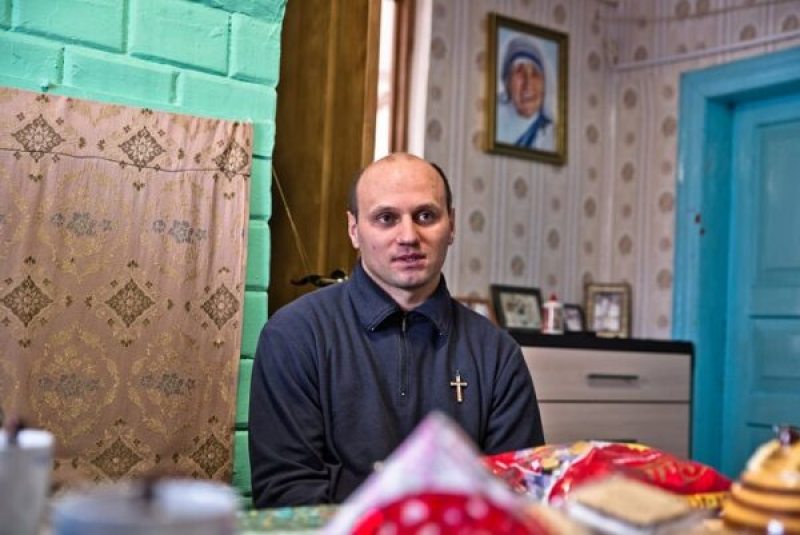How Belarus fails its homeless
Belarus is the host of next month’s European Games. This is bad news for the country’s many homeless. Already facing a hostile bureaucracy and lacking decent shelters, the homeless will be targeted for ‘street cleaning’ by the authorities.
With its sweeping boulevards and glowering concrete facades, Minsk is a city built to impress. Belarus’s capital is Europe’s cleanest, tidied nightly by armies of municipal working. It is an ordered, regimented city in an ordered, regimented country.
But on a glum March afternoon out on the city’s outskirts, Stalinist grandeur is forgotten. Between newly sprouted housing blocks and rickety old wooden bungalows, a muddy track winds towards The Shelter.
Once a sprawling wooden cottage, nowadays, The Shelter is so rotten that it has decayed into three individual sub-shacks. Walls have caved in and ceilings blown off. It has no name; apart from the homeless men who live in it, few even know it exists.
When I visit, perhaps 15 men call it home. In the dead of winter, this can swell to dozens more. A cross-section of post-Soviet desperation: divorcees and drug addicts, alcoholics and Afghanistan veterans huddled in the broken shanties. The authorities leave The Shelter alone. They like to have somewhere to hide its residents far away from visitors and video cameras.
That afternoon, the mood is flat. A local Evangelical church has dropped by to donate food and clothes. Alexey, one of the congregants and himself formerly homeless, says matter-of-factly that The Shelter doesn’t have long left. ‘They want to build here. New towers. They’re sending people round to get them out’.
He doesn’t know what will happen to the men who live here.
—
Homelessness should not exist in Belarus. Under its first and only president, Alexander Lukashenko, the country has adopted a neo-Soviet style in everything from state symbols, where the national flag is modelled on the pre-1991 version, to public policy, where the economy is still largely state-run.
To its defenders, the Belarusian regime has overseen a soft transition that has avoided the poverty, chaos and oligarchy of other former-Soviet republics. To its critics, Belarus’ government maintains a charade of post-Soviet social peace, enforced by an authoritarian regime and security apparatus.
All citizens are guaranteed affordable housing by the Belarusian constitution. The government must “grant housing free of charge or at available prices in accordance with the law to those who are in need of social protection”. In practice, however, this is not a right the state is interested in enforcing.
No one knows how many homeless people there are in Belarus. Official data, haphazardly gathered and of dubious accuracy, recorded only 587 homeless people nationwide in the 2009 census. Four years later, that figure appeared to have soared by almost 600 per cent when the Ministry of Labour announced it had 4000 homeless people on its books.
Both figures are gross underestimates. The Belarusian state’s definition of homelessness could have been designed to understate the issue. Resurrecting an old Soviet euphemism, ‘without fixed place of residence’, abbreviated in Russian to the slur ‘bomzh’ (loosely, ‘hobo’), it stipulates that, in order to be considered formally ‘homeless’, a person cannot have any access, however tenuous, to housing. They must, in effect, be literally wandering the streets.
People forced to sleep in obviously inadequate places: garages or sheds, for example, do not count as homeless. Nor do those who have lost access to their homes through family or relationship breakdown.
Even more restrictively, the law stipulates that those in employment cannot, by definition, be homeless. Homeless people are those who exist on ‘vagrancy and/or begging’ alone.
The result of this semantic quibbling is an unseen mass of Belarusians who are functionally, but not legally, homeless, and are cut off from state help. No one knows how many these people are. Counting them is practically impossible.
Sasha, a wiry man in his early 40s, is one of them. He’s one of the lucky ones. He doesn’t beg. He doesn’t drink, unlike the vast majority of homeless people in Gomel, the gritty industrial city he calls home. Nor, in contrast to perhaps a third of all Belarusian homeless, has he ever been in prison.
Sasha’s homelessness is more banal than tragic. Like many in Belarus’ depressed factory towns, he gravitated over the Russian border, working for months at a time as a security guard in a Moscow supermarket. When he came back to Gomel, his girlfriend, with whom he had lived, had married another man and wanted him out of their flat.
“I’m still registered there, so I’m not a bomzh. But I obviously can’t live there”, he explains ruefully. Thrown out on the street with nowhere to go, he ended up at a soup kitchen run by nuns of the Order of Mother Theresa of Calcutta. He’s still there now, working as a caretaker in exchange for food and a small room above the refectory.
—
Sasha is fortunate to live in Gomel. Without the city’s nuns, his story would likely have a very different ending.
Failure to accurately measure the extent of the homelessness problem in Belarus has left the country without a strategy to combat it. High-minded pledges are forgotten. Instead, the government farms out the issue to the municipalities.
Each city is required by the authorities to prepare a plan for the provision of care to the homelessness population. In practice, however, local authorities need not actually do anything.
Many choose not to. In Gomel, the city council had been promising to open a homeless shelter since 2011. It finally did so only at the end of 2018, when the local Red Cross set up shop. In Brest, Belarus’ fifth-largest city, no provision whatsoever is made for the 200 or so locals without a home.
Homeless Belarusians caught in cities without shelters are effectively trapped: they cannot get help in their hometowns, but are often unable to leave. They become reliant on local friends and contacts for the bare necessities of survival.
In better-provisioned cities, Belarus’ homeless are caught in a bureaucratic bind. Shelters require their residents to register as officially homeless with the local police. Assuming they meet the strict legal requirements to do so, and that the police are willing to register them, new comers are required to pay for the privilege of registering as homeless.
This presents a major barrier to seeking help. One homeless man told investigators from a local human rights organisation, he had to “stand outside of a shop and panhandle for cash” to even afford the right to begin seeking help. Should they get the money they need, Belarus’ would-be homeless are then required to present their passport, a document which few have. Every so often they show up with their ancient Soviet passports that expired almost thirty years ago.
Not surprisingly, state homeless shelters across the country are almost never full. Many homeless Belarusians, it seems, would rather take their chances on the street than grapple with a hostile bureaucracy.
Complicating the picture are negative attitudes to the problem of ‘bomzh’. Belarusian media portrays vagrancy as a lifestyle choice made by the feckless and incompetent, attitudes echoed by officials.
“Every [homelessness] case is different”, asserted Liliya Sinukevich, director of the Department of Social Protection in Grodno, “but it is almost always the individual’s own fault. Everyone chooses their own path.” It is these attitudes that fill the vacuum left by an uninterested state.
—
For many of Belarus’s homeless, their last resort is a dusty little hamlet a few miles from the Lithuanian frontier. Here, in a small hut full of photographs of Mother Theresa and English, Polish and Italian-language Catholic paraphernalia, lives Brother Luigi.
Luigi, whose real name is Alexey Shedrov, converted to Catholicism during a prison term for illegally fencing medication from the ambulance in which he worked. Inspired by Mother Theresa, Luigi opened a refuge for the homeless in 2011. In the eight years since, 300 people have passed through his doors. Thirteen of them died there. Three have successfully rehabilitated.
Brother Luigi’s problems began in 2013. That year he was raided for the first time by the KGB, Belarus’ archaically-named secret police. They confiscated his religious literature, hauling it off to Minsk for examination.
A year later, they charged him with running an unregistered religious organisation. Facing two more years in prison, he was acquitted only after the Catholic hierarchy interceded on his behalf.
Luigi’s experience was hardly unusual. In 2014, as Belarus prepared to host the World Ice Hockey Championship, the government began cracking down on visible homelessness. In Minsk, volunteers were arrested for distributing food to people on the streets.
The homeless themselves became the targets of police ‘street cleaning’ operations, during which they were rounded up and dumped outside the city. According to one witness, the police “took them to who knows where … They took them, and that’s it. They got lost … barely got back.”
For the Belarusian authorities, whose legitimacy rests on the image of a placid, orderly country, the reality of homelessness is an embarrassing one. Even so, the repression is less the result of a coherent policy on homelessness, and more a consequence of no policy at all. Artyom Shraibman, political editor of local news site TUT.BY said, “the presidential administration doesn’t draw up lists … they just tell the Ministry of the Interior to get the city in order”. “Street cleaning” is the result of a state uninterested in the homeless, but very interested in preserving its own national self-image.
After 2014, crackdowns on the homeless eased off. However, in June, Belarus will host the European Games. Activists expect brutal policies such as “street cleaning” to return with a vengeance.
Already, Brother Luigi is feeling the pinch. This January, he was arrested on suspicion of theft, interrogated and beaten. In March, the police returned, demanding a full list of donations, and that he pay taxes on the ‘revenue’ generated. It was an unsubtle warning to cease and desist.
For Belarus’s homeless, Brother Luigi’s fate is a canary in the coal mine. Official apathy could see the country’s few homelessness activists shut down. If they are, the future looks bleak for Belarus’s most vulnerable citizens.
Author: Felix Light, neweasterneurope.eu.
This project was possible with the help of Libereco, a Swiss-German NGO that campaigns for human rights in Belarus and Ukraine.




















